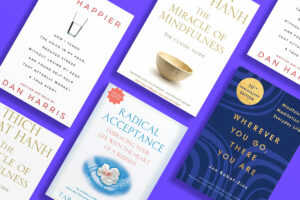
Embarking on a self-growth journey is one of the most rewarding decisions you can make. It opens doors to continuous improvement, enhanced self-awareness, and achieving both personal and professional goals. Integrating specific daily habits into your routine can have a profound impact on your development and well-being. Here are ten habits that can kickstart your self-growth journey and keep you on the path to continuous improvement.
1. Start Your Day with Mindfulness
Mindfulness practices, such as meditation or deep-breathing exercises, can set a positive tone for your day. Mindfulness helps you stay present and focused, reducing stress and enhancing emotional regulation. A study published in the journal Psychological Science found that mindfulness can improve attention, cognition, and emotional resilience.
Action Step
Download a meditation app like Headspace or Calm and follow a guided session each morning. Begin with just five to ten minutes, focusing on your breath and being present in the moment. As you become more comfortable, you can gradually increase the duration.
The Science Behind Mindfulness
Mindfulness practices have been extensively researched, revealing numerous benefits. According to the American Psychological Association (APA), mindfulness improves attention, reduces rumination, and enhances emotional regulation. These benefits contribute to better mental health and increased life satisfaction. Additionally, mindfulness can lower stress hormone levels, improve sleep quality, and boost immune function.
Mindfulness in Daily Life
Implementing mindfulness in your daily routine doesn’t have to be limited to meditation. You can practice mindfulness while eating, by savoring each bite, or while walking, by paying attention to the sensations in your body and your surroundings. This integration of mindfulness into everyday activities can further enhance your ability to stay present and reduce stress throughout the day.
2. Set Daily Intentions
Setting daily intentions creates a focused and purposeful day. Unlike goals, which are specific outcomes you strive to achieve, intentions are guiding principles for how you want to approach your day. They provide clarity and direction, helping you stay aligned with your values and objectives.
Action Step
Every morning, take a few moments to write down one or two intentions for the day. For example, “I intend to approach my work with a positive attitude” or “I intend to listen actively during conversations.”
The Power of Intentions
Setting intentions can significantly influence your mindset and behavior. According to a study published in the Journal of Personality and Social Psychology, individuals who set intentions are more likely to engage in behaviors that align with their values and goals. Intentions help you stay focused on what matters most and can enhance your overall sense of purpose and direction.
Examples of Daily Intentions
Daily intentions can vary greatly depending on your personal goals and values. Some examples include:
- “I intend to practice patience and kindness in all my interactions.”
- “I intend to take time for self-care and rest.”
- “I intend to focus on my health by eating nutritious foods and exercising.”
These simple yet powerful statements can guide your actions and decisions throughout the day, ensuring that you remain aligned with your broader life goals.
3. Engage in Physical Activity
Regular physical activity is essential for maintaining both physical health and mental clarity. Exercise releases endorphins, which improve your mood and energy levels. According to the Mayo Clinic, regular exercise can also reduce anxiety, and depression, and improve cognitive function.
Action Step
Schedule 30 minutes of exercise into your daily routine, whether it’s a morning jog, yoga session, or a quick workout at home. Find an activity that you enjoy to make it a sustainable part of your routine.
Benefits of Exercise on Mental Health
Exercise has a profound impact on mental health. A study published in The Lancet Psychiatry journal found that regular physical activity can reduce symptoms of depression and anxiety. Exercise promotes the release of endorphins, which are natural mood lifters. It also increases blood flow to the brain, supporting cognitive function and overall brain health.
Types of Physical Activities to Consider
Physical activity isn’t limited to traditional forms of exercise like running or lifting weights. Consider incorporating activities that you enjoy and that fit seamlessly into your lifestyle:
- Dancing: Great for cardio and can be done at home.
- Hiking: Combines physical activity with the benefits of being in nature.
- Swimming: Low-impact and excellent for overall body conditioning.
- Group Sports: Adds a social component to your exercise routine.
Experiment with different activities to find what keeps you motivated and engaged.
4. Read Every Day
Reading expands your knowledge, stimulates your mind, and can provide new perspectives. Aim to read at least 20 pages a day. This habit can include books, articles, or even book summaries, which allow you to efficiently digest key insights from multiple books.
Action Step
Subscribe to a service like BookBits to get daily summaries of insightful books tailored to your interests and professional growth. This way, you can stay informed and inspired without committing hours each day to reading.
The Cognitive Benefits of Reading
Reading engages your brain, improving cognitive function and expanding your vocabulary. According to research from the National Endowment for the Arts, regular reading can enhance empathy, critical thinking, and focus. Additionally, a study published in the Journal of Neurology found that reading can slow the progression of cognitive decline in older adults.
Selecting Reading Material
To maximize the benefits of reading, choose a variety of genres and topics:
- Non-fiction: Enhances knowledge and skills in specific areas.
- Fiction: Improves empathy and creativity.
- Biographies: Provides inspiration and insights into different life paths.
- Self-help: Offers practical advice for personal development.
Creating a reading list or subscribing to a service like BookBits can help ensure you always have engaging and informative material at hand.
5. Practice Gratitude
Gratitude has been linked to numerous mental health benefits, including increased happiness and reduced stress. Practicing gratitude can shift your focus from what you lack to what you have, fostering a positive mindset and enhancing your overall well-being.
Action Step
Keep a gratitude journal and write down three things you are grateful for each day. Reflect on both small and significant aspects of your life that bring you joy and satisfaction.
The Psychological Impact of Gratitude
Gratitude practices have been shown to improve mental health and overall life satisfaction. A study published in the journal Personality and Individual Differences found that gratitude can reduce feelings of envy, enhance relationships, and improve sleep quality. By focusing on the positive aspects of your life, you cultivate a more optimistic outlook.
Expanding Your Gratitude Practice
To deepen your gratitude practice, consider these additional steps:
- Express Gratitude to Others: Tell people in your life why you are grateful for them.
- Gratitude Meditation: Spend a few minutes in meditation focusing on things you are thankful for.
- Gratitude Walk: Take a walk and consciously appreciate your surroundings.
Incorporating these practices can further enhance your sense of gratitude and well-being.
6. Reflect and Review
Taking time to reflect on your day helps you understand what worked, what didn’t, and how you can improve. This practice fosters self-awareness and personal growth. According to research published in the Harvard Business Review, reflection can enhance performance and productivity.
Action Step
Spend 10 minutes each evening reviewing your day. Note your achievements, challenges, and areas for improvement. Consider what you can do differently tomorrow to enhance your success and well-being.
The Benefits of Reflection
Reflection helps you gain insights into your behaviors and decision-making processes. A study from the Harvard Business School found that individuals who engage in regular reflection are more productive and perform better in their roles. Reflecting on your experiences allows you to identify patterns, learn from mistakes, and make more informed decisions.
Daily Reflection Questions
To guide your reflection process, consider these questions:
- What did I achieve today?
- What challenges did I face and how did I handle them?
- What can I improve upon tomorrow?
- What am I proud of today?
- How did I feel throughout the day and why?
Using these questions can provide structure to your reflection time, making it more effective and meaningful.
7. Learn Something New
Continual learning is a cornerstone of self-growth. It keeps your mind sharp and can open up new opportunities. This could be learning a new skill, language, or even a hobby. The process of learning stimulates brain activity and keeps you engaged with the world around you.
Action Step
Dedicate at least 20 minutes a day to learning something new. Use online platforms like Coursera, Udemy, or even dive into book summaries to quickly gain knowledge from various fields. Consider subscribing to newsletters or podcasts that provide regular updates on topics of interest.
The Importance of Lifelong Learning
Lifelong learning promotes cognitive resilience and adaptability. According to a study published in the journal Psychological Science, continuous learning can enhance memory, problem-solving skills, and creativity. Engaging in new learning experiences also helps you stay relevant in a rapidly changing world.
Exploring New Learning Resources
To keep your learning process dynamic and engaging, explore a variety of resources:
- Online Courses: Platforms like Coursera and Udemy offer courses on almost any subject.
- Podcasts: Listen to educational podcasts during your commute or while exercising.
- Workshops and Seminars: Attend local or online events to learn from experts and network with others.
- Books and Articles: Stay updated with the latest trends and developments in your field of interest.
This diversity in learning resources can help maintain your interest and enhance your knowledge in multiple areas.
8. Connect with Others
Building and maintaining relationships is crucial for personal and professional development. Engaging in meaningful conversations and networking can provide support, new ideas, and different perspectives. According
Building and maintaining relationships is crucial for personal and professional development. Engaging in meaningful conversations and networking can provide support, new ideas, and different perspectives. According to a study by Harvard University, strong social connections contribute to longevity and happiness.
Action Step
Make it a point to reach out to a friend, family member, or colleague each day, even if it’s just a quick message to check-in. Schedule regular meet-ups or virtual calls to maintain and strengthen these connections.
The Power of Social Connections
Social connections are vital for mental and emotional health. Research from the Harvard Study of Adult Development, one of the longest-running studies on adult life, found that strong relationships are a significant predictor of happiness and longevity. Social interactions provide emotional support, reduce stress, and promote a sense of belonging.
Building Quality Connections
To build and maintain strong relationships, consider the following tips:
- Active Listening: Show genuine interest in others by listening attentively and responding thoughtfully.
- Be Present: Give your full attention during interactions, whether in person or virtual, by minimizing distractions.
- Express Appreciation: Regularly show appreciation and gratitude for the people in your life.
- Be Supportive: Offer support and encouragement, and be there for others during their times of need.
By investing time and effort into your relationships, you create a supportive network that can significantly enhance your well-being.
9. Prioritize Self-Care
Self-care is about maintaining a healthy relationship with yourself. It involves activities that recharge and rejuvenate you, helping you stay balanced and effective in your daily life. Self-care is not selfish; it’s essential for sustaining your energy and well-being.
Action Step
Schedule time for self-care activities such as reading, taking a bath, or engaging in a hobby you enjoy. Ensure that you allocate time each day to do something that brings you joy and relaxation.
The Role of Self-Care in Well-Being
Self-care practices support overall health and well-being. A study published in the Journal of Clinical Psychology found that self-care activities, such as relaxation techniques and leisure activities, can reduce stress and improve mood. Prioritizing self-care ensures that you have the physical and emotional resources to meet the demands of daily life.
Creating a Self-Care Routine
To establish a consistent self-care routine, consider these steps:
- Identify Your Needs: Determine what activities make you feel relaxed and rejuvenated.
- Set Boundaries: Learn to say no to commitments that drain your energy, and protect your personal time.
- Schedule Self-Care: Treat self-care as an essential part of your day by scheduling it in your calendar.
- Stay Consistent: Make self-care a non-negotiable part of your routine, even during busy times.
Regular self-care can help you maintain a healthy balance, preventing burnout and promoting overall well-being.
10. Set and Review Your Goals
Having clear goals gives you direction and motivation. Breaking down your long-term goals into smaller, manageable tasks makes them more achievable and less overwhelming. Regularly reviewing your goals helps you stay on track and make necessary adjustments.
Action Step
Write down your long-term goals and break them into monthly and weekly objectives. Review your progress weekly and adjust your plans as needed. Use tools like SMART (Specific, Measurable, Achievable, Relevant, Time-bound) criteria to set effective goals.
The Science of Goal Setting
Goal setting is a powerful tool for personal and professional growth. Research published in the Journal of Applied Psychology found that individuals who set specific and challenging goals are more likely to achieve higher performance levels. Reviewing and adjusting your goals regularly ensures that they remain relevant and aligned with your evolving aspirations.
Tips for Effective Goal Setting
To set and achieve your goals effectively, consider these strategies:
- Be Specific: Clearly define what you want to achieve and why it’s important to you.
- Break It Down: Divide larger goals into smaller, manageable tasks.
- Set Deadlines: Assign deadlines to each task to maintain a sense of urgency.
- Track Progress: Regularly review your progress and celebrate milestones.
- Stay Flexible: Be open to adjusting your goals as needed based on new information or changing circumstances.
By following these steps, you can stay focused and motivated on your path to achieving your goals.
Conclusion
Incorporating these ten daily habits into your routine can significantly enhance your self-growth journey. Remember, the key to success is consistency. Start small, gradually integrating these habits into your daily life, and soon you’ll notice the positive changes in your personal and professional development.
For more tips and insights on personal growth, consider exploring book summaries that provide condensed knowledge from the best self-help and personal development books. Subscribing to a service like BookBits can help you stay informed and motivated on your journey to becoming the best version of yourself.
By nurturing these habits, you’re setting the foundation for a lifetime of continuous improvement and success. Start today, and watch your growth unfold.
Additional Tips for Sustained Self-Growth
To further bolster your self-growth journey, consider these additional tips:
Create a Morning Routine
A structured morning routine can set a positive tone for the rest of your day. Include activities such as stretching, reading, and setting intentions. A good morning routine can increase productivity and enhance your mood throughout the day.
Limit Digital Distractions
In today’s digital age, it’s easy to get distracted by social media, emails, and notifications. Set specific times for checking your devices and focus on being present in your tasks and interactions. This can help improve your concentration and reduce stress.
Seek Feedback
Regularly seek feedback from peers, mentors, and colleagues. Constructive feedback can provide valuable insights into your strengths and areas for improvement, helping you grow more effectively. Use this feedback to refine your strategies and achieve your goals.
Embrace Failure
Failure is a natural part of the growth process. Embrace it as a learning opportunity and use it to refine your strategies and approach. Remember, every setback is a setup for a comeback. Learn from your mistakes and keep moving forward.
Stay Curious
Cultivate a curious mindset and always be open to new experiences and knowledge. Ask questions, explore different perspectives, and remain open-minded. This can lead to new opportunities and enhance your overall growth and development.
Practice Patience
Self-growth is a marathon, not a sprint. Be patient with yourself and recognize that progress takes time. Celebrate small victories along the way to stay motivated. Consistent effort over time will yield significant results.
Join a Community
Surround yourself with like-minded individuals who are also on a journey of self-growth. Join online forums, local groups, or professional networks where you can share experiences, learn from others, and stay inspired. A supportive community can provide encouragement and accountability.
By consistently applying these habits and tips, you’ll create a robust framework for continuous self-improvement. Remember, the journey of self-growth is ongoing, and every step you take brings you closer to your full potential. Embrace the process, stay committed, and enjoy the transformation.
Exploring Further: Recommended Resources
To dive deeper into self-growth, consider these additional resources:
Books:
- The Power of Habit by Charles Duhigg
- Atomic Habits by James Clear
- Mindset: The New Psychology of Success by Carol S. Dweck
- The 7 Habits of Highly Effective People by Stephen R. Covey
- Deep Work by Cal Newport
Podcasts:
- The Tim Ferriss Show
- The Tony Robbins Podcast
- Optimal Living Daily
- The School of Greatness by Lewis Howes
- Happier with Gretchen Rubin
Online Courses:
- Learning How to Learn on Coursera
- The Science of Well-Being on Coursera
- Mindfulness Meditation on Udemy
- Productivity Masterclass on Skillshare
- Leadership and Emotional Intelligence on edX
These resources offer valuable insights and practical advice to enhance your self-growth journey. Whether you prefer reading, listening, or interactive learning, there’s something here for everyone. By exploring these materials, you can deepen your understanding and continue to grow.
By integrating these ten habits and utilizing the recommended resources, you’ll be well on your way to a fulfilling and successful self-growth journey. Stay committed, be patient, and embrace the continuous process of becoming the best version of yourself.


